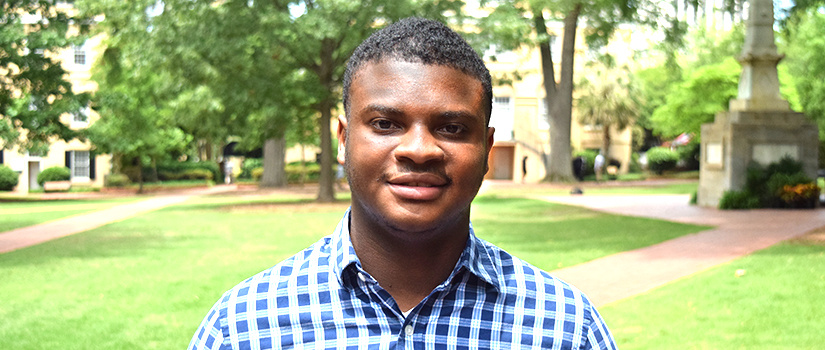Jaquan High was 16 the first time he left South Carolina; his family didn’t have money to travel on extravagant vacations. But whenever they went anywhere, he often was looking at his surroundings and asking himself questions.
“I was always the kid that would ... stare out the window and imagine waterfalls and caves beyond the tree line,” he says. “I always caught myself looking at landforms. That curiosity has always been there.”
That curiosity led High to study geology at the University of South Carolina, which unlocked opportunities for him around the country. In addition to traveling for research as an undergraduate, after graduating in May, he set out on a capstone course exploring geological features in Colorado and Utah.
“My experience at UofSC has been nothing short of amazing,” High says. “I've been able to cultivate experiences that I never had growing up, such as travel opportunities and research internships and fellowships, all by committing to being a good academic.”
It's these life-long friendships that really make our journey of struggles and triumphs worth it, and I'm proud to say UofSC has been my home and the source of all these relationships I've fostered over time.
— Jaquan High
High says the geology field offers a great combination of experiences in the classroom and beyond. In addition to work with faculty on campus, he has worked in two different research fields over the past two summers, thanks to application support from the National Fellowships office.
First was a summer fellowship at the Woods Hole Oceanographic Institute in Massachusetts. He spent the summer living on the southern tip of Cape Cod and going on day trips with scientists in the Atlantic Ocean. It exposed him to a lot of opportunities within science. “That was definitely a life-changing experience, for sure,” he says.
Next came a Hollings Scholarship from the National Oceanic and Atmospheric Administration. That program awards an internship to undergraduate students who want to spend the summer in research. High’s research was based out of an estuary in Washington State. Although the COVID-19 pandemic forced the internship to be virtual, he did get to visit the study site to get oriented to the work.
That visit confirmed High’s career aspirations to work in research.
“That was amazing, getting to know how they work, and seeing the passion that they had," he said. "I was looking at where I want to be 10 years from now.”
Mentors and community
High feels fortunate that he had these experiences in college, and he gives a lot of credit to faculty mentors who helped him figure out the lay of the land as the first in his family to go to college. Asked who some of those mentors are, and he goes on and on: Joe Jones, the faculty principal of the Green Quad where High lived on campus; Claudia Benitez-Nelson, a professor and associate dean in the College of Arts and Sciences; Annie Bourbonnais, an oceanography professor; Althea Counts, director of UofSC's TRIO program for first-generation students; and more.
In addition, his fellow students helped him find his way.
“I think my biggest accomplishment throughout my time here is the network and sense of community that I've established with students, faculty and staff across the campus," High says. “These individuals are some of my greatest mentors and peers, so I cherished them very much, and they've helped me get to where I am today.
“It's these life-long friendships that really make our journey of struggles and triumphs worth it, and I'm proud to say UofSC has been my home and the source of all these relationships I've fostered over time.”
During his final semester at UofSC, High was awarded a National Science Foundation Graduate Research Fellowship, allowing him to continue his education. He plans to earn a Ph.D. in ocean ecology and biogeochemistry at Oregan State University. He wants to explore how organisms interact with sediment in the ocean and how sediment chemistry changes in the deeper parts of the ocean.
In some ways, he’s a lot like his younger self, staring out the window and imagining what’s out there. “For every scientist, discovery is at the center of their core," he says. "Research is definitely the dream.”
